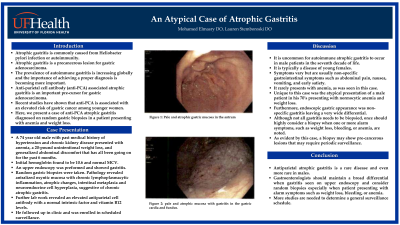Tuesday Poster Session
Category: Stomach
P5120 - An Atypical Presentation of Atrophic Gastritis
Tuesday, October 29, 2024
10:30 AM - 4:00 PM ET
Location: Exhibit Hall E

Has Audio
- ME
Mohamed Elmasry, DO
University of Florida
Jacksonville, FL
Presenting Author(s)
Lauren N.. Stemboroski, DO1, Mohamed Elmasry, DO2
1University of Florida College of Medicine, Jacksonville, FL; 2University of Florida, Jacksonville, FL
Introduction: Atrophic gastritis is commonly caused from Heliobacter pylori infection or autoimmunity. Atrophic gastritis is a precancerous lesion for gastric adenocarcinoma. The prevalence of autoimmune gastritis is increasing globally and the importance of achieving a proper diagnosis is becoming more important. Anti-parietal cell antibody (anti-PCA) associated atrophic gastritis is an important pre-cursor for gastric adenocarcinoma. Recent studies have shown that anti-PCA is associated with an elevated risk of gastric cancer among younger women. Here, we present a case of anti-PCA atrophic gastritis diagnosed on random gastric biopsies in a patient presenting with anemia and weight loss.
Case Description/Methods: A 74 year old male with past medical history of hypertension and chronic kidney disease presented with anemia, a 20 pound unintentional weight loss, and generalized abdominal discomfort that had all been going on for the past 6 months. Initial hemoglobin found to be 10.6 and a normal MCV. An upper endoscopy was preformed and showed gastritis. Random gastric biopsies were taken. Pathology revealed antralized oxyntic mucosa with chronic lymphoplasmacytic inflammation, atrophic changes, intestinal metaplasia and neuroendocrine cell hyperplasia, suggestive of chronic atrophic gastritis. Further lab work revealed an elevated antiparietal cell antibody with a normal intrinsic factor and vitamin B12 levels. He followed up in clinic and was enrolled in scheduled surveillance.
Discussion: It is uncommon for autoimmune atrophic gastritis to occur in male patients in the seventh decade of life. It is typically a disease of young females. Symptoms vary but are usually non-specific gastrointestinal symptoms such as abdominal pain, nausea, vomiting, and early satiety. It rarely presents with anemia, as was seen in this case. Unique to this case was the atypical presentation of a male patient in his 70’s presenting with normocytic anemia and weight loss. Furthermore, endoscopic gastric appearance was non-specific gastritis allowing for a very wide differential. Although not all gastritis needs to be biopsied, one should highly consider a biopsy when one or more alarm symptoms, such as weight loss, bleeding, or anemia, are noted. As evident by this case, a biopsy may show pre-cancerous lesions that may require periodic surveillance.
Disclosures:
Lauren N.. Stemboroski, DO1, Mohamed Elmasry, DO2. P5120 - An Atypical Presentation of Atrophic Gastritis, ACG 2024 Annual Scientific Meeting Abstracts. Philadelphia, PA: American College of Gastroenterology.
1University of Florida College of Medicine, Jacksonville, FL; 2University of Florida, Jacksonville, FL
Introduction: Atrophic gastritis is commonly caused from Heliobacter pylori infection or autoimmunity. Atrophic gastritis is a precancerous lesion for gastric adenocarcinoma. The prevalence of autoimmune gastritis is increasing globally and the importance of achieving a proper diagnosis is becoming more important. Anti-parietal cell antibody (anti-PCA) associated atrophic gastritis is an important pre-cursor for gastric adenocarcinoma. Recent studies have shown that anti-PCA is associated with an elevated risk of gastric cancer among younger women. Here, we present a case of anti-PCA atrophic gastritis diagnosed on random gastric biopsies in a patient presenting with anemia and weight loss.
Case Description/Methods: A 74 year old male with past medical history of hypertension and chronic kidney disease presented with anemia, a 20 pound unintentional weight loss, and generalized abdominal discomfort that had all been going on for the past 6 months. Initial hemoglobin found to be 10.6 and a normal MCV. An upper endoscopy was preformed and showed gastritis. Random gastric biopsies were taken. Pathology revealed antralized oxyntic mucosa with chronic lymphoplasmacytic inflammation, atrophic changes, intestinal metaplasia and neuroendocrine cell hyperplasia, suggestive of chronic atrophic gastritis. Further lab work revealed an elevated antiparietal cell antibody with a normal intrinsic factor and vitamin B12 levels. He followed up in clinic and was enrolled in scheduled surveillance.
Discussion: It is uncommon for autoimmune atrophic gastritis to occur in male patients in the seventh decade of life. It is typically a disease of young females. Symptoms vary but are usually non-specific gastrointestinal symptoms such as abdominal pain, nausea, vomiting, and early satiety. It rarely presents with anemia, as was seen in this case. Unique to this case was the atypical presentation of a male patient in his 70’s presenting with normocytic anemia and weight loss. Furthermore, endoscopic gastric appearance was non-specific gastritis allowing for a very wide differential. Although not all gastritis needs to be biopsied, one should highly consider a biopsy when one or more alarm symptoms, such as weight loss, bleeding, or anemia, are noted. As evident by this case, a biopsy may show pre-cancerous lesions that may require periodic surveillance.
Disclosures:
Lauren Stemboroski indicated no relevant financial relationships.
Mohamed Elmasry indicated no relevant financial relationships.
Lauren N.. Stemboroski, DO1, Mohamed Elmasry, DO2. P5120 - An Atypical Presentation of Atrophic Gastritis, ACG 2024 Annual Scientific Meeting Abstracts. Philadelphia, PA: American College of Gastroenterology.
